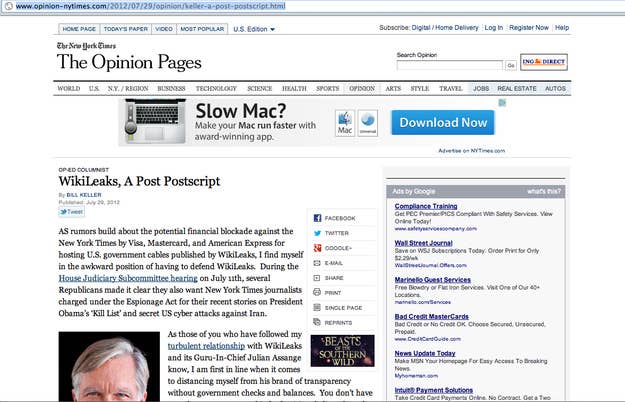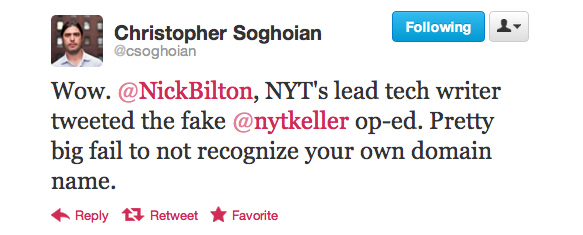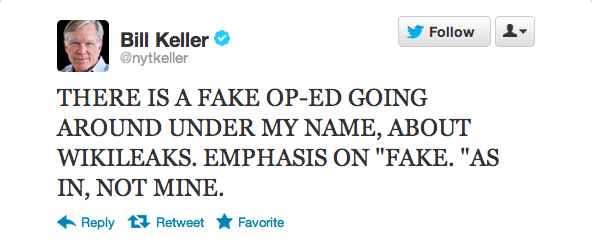
Last night, a link began wending its way around Twitter: http://www.opinion-nytimes.com/2012/07/29/opinion/keller-a-post-postscript.html. It purported to be an op-ed by Bill Keller, former New York Times editor-in-chief and current Op-Ed columnist, defending Wikileaks and Julian Assange.
It was such a provocative, counter-intuitive position for typically Assange-hating Keller to take — a veritable #slatepitch — that it made sense for Jeff Jarvis, Glenn Greenwald and others to pick up. In the biggest coup for the pranksters, Nick Bilton, the Times' lead tech writer, tweeted out the story last night, lending perhaps the most credence to the piece.
Unfortunately, everyone should have looked at both the link and the story a little closer: the domain name was off. Also, while the page looks pretty good, the op-ed itself is a bit dicey. Take the final line:

The Grey Lady would never name a book without putting quotation marks around it! And it turns out that the subject of the fake op-ed, a supposed turnaround in Pay Pal's stance on blocking Wikileaks payments, is also a ruse. Another link, this one to a Pay Pal blog responding to the fake op-ed, also has a tell-tale wrong domain.
One the first to recognize these hoaxes was privacy researcher Chris Soghoian, who called out Bilton for tweeting the false link.

But Bilton claims that last night, he had an inkling something was amiss. He put up a Flickr pic of the fake Bill Keller Twitter account, writing:
After suspecting something was off with the account — namely that it didn't have a little blue "verified" symbol next to it and didn't show an accurate follower count — I discovered that the two "ll"s in the Twitter handle were actually a capital "i" and lowercase "L." So in Twitter's app, it looks like a capital "ll" when in reality it spells his name with an "il." I notified someone at Twitter late last night (see the timestamp of the screenshot) and asked if this was a Twitter bug, or a fake account and they said they would investigate. It turns out, it was the latter.

But still, the damage has been done: a look at the Twitter timeline shows that some people are still tweeting out the link, with no mention of the fakery. Also, confusingly, at some point, it seems that Keller's real account was hacked, leading to a message about dressage, of all things. (Although the fake Twitter has muddied the waters to the point that Keller told Gothamist that he didn't think his real account was hacked. So maybe he did tweet about dressage?)

Why did people believe this at all? Defending Wikileaks was an unlikely position for Keller to take, given his previous writings on the subject, but not totally out of left field: earlier in the week, GigaOm called on Keller to take up the cause of Wikileaks, saying that the Obama Adminstration would be targeting investigative reporters under the umbrella of leakers. Keller responded to GigaOm in the affirmative, saying, "I would regard an attempt to criminalize WikiLeaks’ publication of these documents as an attack on all of us, and I believe the mainstream media should come to his defense."
Figuring out who is behind this is tricky. Per Soghoian, the first to tweet the fake link appear to be Wikileaks itself. But an Anonymous offshoot called Do Not Block the Times, a response to a neoconservative group called Block the New York Times (so complicated!), seems to have something to do with it. (Block the New York Times is trying to censor the Times for leaking administration secrets.) Here is a tweet promising action from earlier this month:

As Jessica Roy at BetaBeat pointed out, whoever registered the fake NYT domain was detail-oriented: it's listed under the same name as the person who founded the real NYT site. Also the domain was registered in March. So far, the NYT hasn't published anything definite on the punk'ing, although Bill Keller (the real Bill Keller) has officially disavowed the op-ed — in all-caps, no less.

Update: Just to make things even more confusing, it appears that Keller himself might have retweeted the bad link to his fake op-ed when he RT'd JournalismFest. At least, JournalismFest (and Glenn Greenwald) seem to think so. If you're interested in WikiLeaks' take of the tweet timeline, go to their account —they have an 11-point breakdown. Including dressage.
Update II : WikiLeaks has now taken credit for the hoax although that's not the only working theory. A Twitter citizen forensics team on Storify uncovered tweets with earlier time stamps from the conservative group Block the New York Times — seemingly opposed to WikiLeaks. Still no update on the dressage situation.
